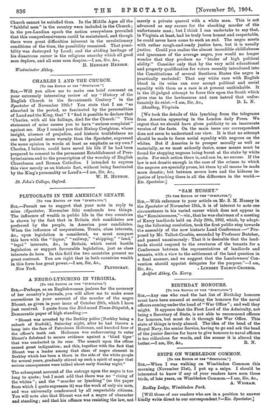"Blount was arrested by the Berkley police [B erkley being
a suburb of Norfolk], Saturday night, after he had thrown a lamp into the face of Patrolman Holloman, and knocked four of the officer's teeth out. Holloman was endeavouring to enter Blount's fishstand to secure evidence against a blind tiger' that was conducted in its rear. The assault upon the officer caused great indignation; and this, together with the fact that Blount was a leader among that class of negro element in Berkley which has been a thorn in the side of the white people for several years, gradually stirred up such a spirit of anger that serious consequences were talked about early Sunday night."
The subsequent account of the outrage upon the negro is too long to quote ; but I must add that there was no " rising of the whites "; and the " murder or lynching" (as the paper from which I quote expresses it) was the work of only six men, and was universally condemned by all respectable citizens. You will note also that Blount was not a negro of character and standing ; and that his offence was resisting the law, not merely a private quarrel with a white man. This is not advanced as any excuse for the shocking murder of the unfortunate man ; but I think I can undertake to say that, in Virginia at least, had he truly been honest and respectable, be could never have come to such an end. The negro meets with rather rough-and-ready justice here, but it is usually justice. Could you realise the almost incredible childishness and ignorance of the average negro, you would no longer wonder that they produce no " leader of high political ability." Consider only that by the very mild educational and property qualification for voters recently introduced into the Constitutions of several Southern States the negro is practically excluded ! That any white race with English blood in its veins can ever accept political and social equality with them as a race is at present unthinkable. It is the ill-judged attempt to force this upon the South which gives rise to the lawlessness and race hatred that unfor- tunately do exist.—I am, Sir, &c., D. L. N. Slwalbay, Virginia.
[We took the details of this lynching from the telegrams from America appearing in the London daily Press. We regret that we should have given publicity to an inaccurate version of the facts. On the main issue our correspondent does not seem to understand our view. It is that no attempt should be made to force social equality with negroes on the whites. But if America is to prosper morally as well as materially, as we most ardently desire, some means must be found for stopping negroes being burnt at the stake by white mobs. For such action there is, and can be, no excuse. If the law is not drastic enough in the case of the crimes to which the negroes are specially prone, let them by all means be made more drastic; but between severe laws and the hideous in- justice of lynching there is all the difference in the world.— ED. Spectator.]
" SAM HUSSEY."
[To THE EDITOR OF TEE "SPEOTATOR:l














































 Previous page
Previous page